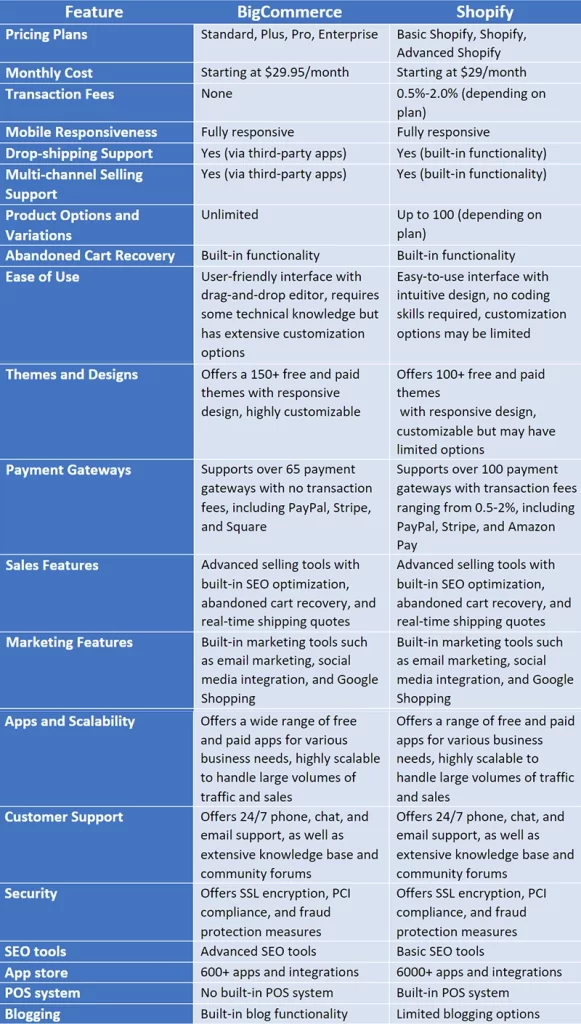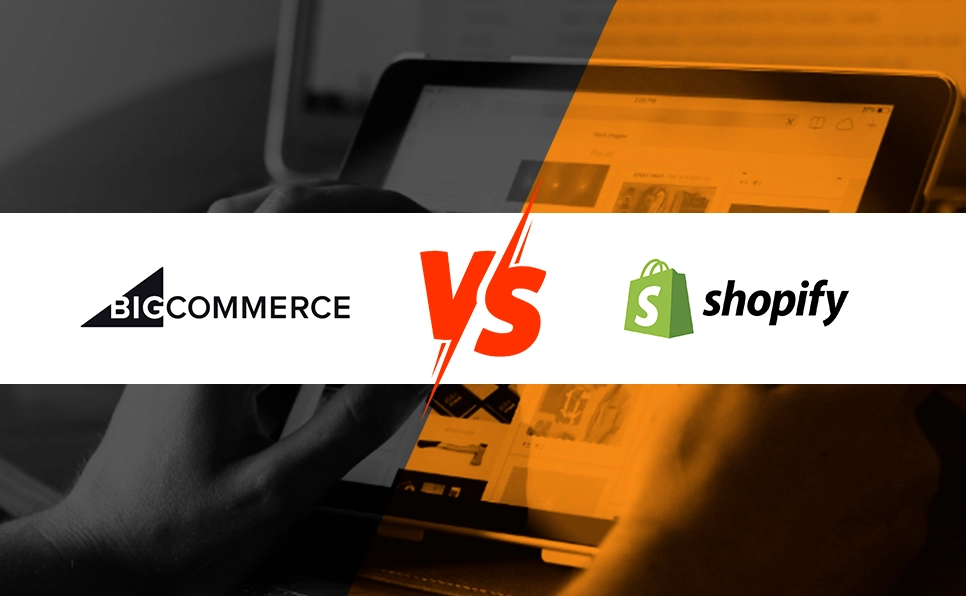Introduction
With online shopping becoming more popular than ever, having a reliable and efficient eCommerce platform is essential for businesses of all sizes.
Today, consumers expect a smooth and hassle-free online shopping experience, and the right eCommerce platform can help businesses deliver just that.
According to Statista, global eCommerce sales exceeded a whopping $4.2 trillion in 2020, and it is projected to grow even further, reaching over $6.4 trillion by 2024.
Infact, Global ecommerce sales are expected to total $6.3 trillion worldwide in 2023.
That’s massive growth in the industry and choosing the right eCommerce platform can be a game-changer for businesses looking to capitalize on this trend.
However, with so many eCommerce platforms out there, it can be overwhelming to choose the right one.
Two of the most popular eCommerce platforms are BigCommerce and Shopify, but how do they stack up against each other?
That’s what we’ll be diving into in this blog, so you can make an informed decision and choose the right platform between bigcommerce vs shopify for your business.
Let’s go…
BigCommerce Vs Shopify – An Overview
BigCommerce and Shopify are two of the most popular eCommerce platforms available today.
Let’s take a closer look at each platform and compare their key features and functionalities.
#1. What is BigCommerce?
BigCommerce is an e-commerce platform that allows businesses of all sizes to create and run their own online stores. It was founded in Australia back in 2009, and since then, it’s become one of the most popular platforms out there.
In fact, it’s responsible for over $25 billion in online sales and has more than 95,000 active stores.
If you have a physical store and you want to start selling online, BigCommerce is a great choice. It’s a hosted solution, which means that it’s easy to set up and get started.
But what if you want to customize your store? Can you do that with BigCommerce?
The answer is YES!
While it’s not an open-source platform, BigCommerce offers a ton of built-in features and powerful open APIs that make it easy to customize and grow your business.
And the best part?
You don’t need to be a developer to make changes to your store.
Some big-name companies use BigCommerce, like Toyota, Bliss, and DressUp.
But can it work for smaller businesses too?
Absolutely! In fact, many startups use BigCommerce to set up their online stores.
So, if you’re curious about BigCommerce, why not give it a try?
#2. What is Shopify?
Shopify is an all-in-one eCommerce platform that allows individuals and businesses to create online stores and sell products or services. It’s another popular eCommerce platform that was founded in Canada back in 2004.
Since then, it’s become a household name in the industry, powering over 1.7 million online stores and generating over $200 billion in total sales.
It’s an all-in-one eCommerce platform that’s designed to make it easy for anyone to start and grow an online business. Even if you don’t have a lot of technical knowledge, you can play around with the platform and quickly build your own store.
Fun fact: Shopify has over 4 million users in 175 different countries around the world! And in the US eCommerce platform market, Shopify has the highest market share at 29%.
That’s pretty impressive, don’t you think?
Some big brands have used Shopify too, like Gymshark, Red Bull GmbH, Heinz, and Lindt.
If you’re curious about Shopify and how it works, you should visit their website once!
BigCommerce Vs Shopify – A Detailed Comparison

While BigCommerce and Shopify are both fantastic in their own right, there are key distinctions that make one platform more appropriate for particular sorts of users than the other. Some industry insiders claim that Shopify is the best, although BigCommerce holds its own extremely well.
Here is a side-by-side comparison chart of some of the key features of BigCommerce vs Shopify:
1. Pricing Point
When it comes to BigCommerce vs Shopify, pricing is one of the first things people want to know about.
Both offer free trials and plans ranging from around $39 to $399, but there are some differences.
- BigCommerce has four pricing plans, starting at $39/month and going up to custom pricing for their Enterprise plan.
The higher the plan, the more features you get, such as real-time shipping quotes and unlimited products. Plus, there are no transaction fees, and you can have unlimited file storage and staff accounts.
- On the other hand, Shopify has five pricing plans, starting at $5/month for their Starter plan and going up to custom pricing for their Shopify Plus plan.
While the Basic Shopify plan includes abandoned cart recovery, you’ll need to upgrade to the Plus plan with BigCommerce to get that feature.
So, when it comes to BigCommerce vs Shopify pricing, it’s all about what features you need and how much you’re willing to spend.

2. Ease Of Use
When comparing BigCommerce vs Shopify, ease of use is an important factor to consider.
- BigCommerce was designed for beginners, but it’s also versatile enough for experienced users to modify code in their stores.
While it may take some time to understand the platform, BigCommerce’s out-of-the-box functions can help grow your business. Plus, their drag-and-drop feature outperforms Shopify’s design flexibility.
- On the other hand, Shopify’s minimal dashboard is easy to navigate, and their onboarding process and user-friendly editor make it a favorite among users.
Shopify’s left-hand main menu provides access to all necessary options, and a wizard guides you through the setup process.
Regardless of your experience level, both platforms offer tutorials and free trials to help you get started.
3. Themes and Designs
When it comes to themes and design, Shopify vs BigCommerce have responsive themes that can be customized to fit different industries.
- Shopify offers eight free themes and more than 70 paid themes that range in cost from $150 to $350.
- On the other hand, BigCommerce has 12 free themes and over 150 paid themes that range in price from $150 to $300.
Although both platforms offer mobile-friendly themes, Shopify is known for being a few steps ahead of the competition when it comes to theme design and usability.
So, if you’re looking for a platform that offers a wider range of modern and stylish themes, Shopify might be the better choice for you.
4. Payment gateways
When it comes to payment gateways, both Shopify and BigCommerce offer integration with third-party options like Paypal and Stripe.
- However, Shopify has its own payment provider called Shopify Payments, which allows for a smooth and secure transaction with no extra fees.
- BigCommerce, on the other hand, doesn’t have a built-in payment processor, but it offers integration with over 65 payment gateways and 250 local payment methods.
Some of these options include Amazon Pay, Paypal, and Square.
Plus, all of BigCommerce’s payment gateways come with features like no transaction fees and mobile optimization.
5. Sales Features
When it comes to sales features, both Shopify and BigCommerce have some pretty cool options to offer.
- Firstly, let’s talk about the Abandoned Cart Saver feature. This feature can help you save those almost-lost sales by sending follow-up emails to customers who abandoned their cart without checking out.
Both Shopify and BigCommerce have this feature available, and it can help you recover some revenue that would have otherwise been lost.
- Moving on to point of sale (POS) options, Shopify has its own POS system, while BigCommerce integrates with various POS systems, such as Square and Clover.
- Coupons and discounts are essential for any eCommerce store, and both platforms have these options available. Shopify even allows for automatic discounts at checkout.
- Product customization is another important feature that both platforms offer. You can add product options, such as color or size, and let customers customize their order.
- Lastly, multi-channel selling is an option on both platforms. You can sell on social media, Amazon, and more. Shopify integrates with Instagram, while BigCommerce integrates with Amazon, eBay, and more.
Overall, bigcommerce vs shopify platforms have excellent sales features that can help you grow your business.
6. Marketing Feature
The comparison between BigCommerce vs Shopify comes to the fact that both of them offer a variety of marketing features to help online businesses increase their reach and sales.
- BigCommerce offers built-in SEO optimization, social media integrations, email marketing, and product reviews. They also have a feature called Abandoned Cart Saver, which automatically sends email reminders to customers who have left items in their shopping cart.
- Shopify has similar marketing features, including SEO optimization, social media integrations, and email marketing. Additionally, they offer a Point of Sale (POS) system, coupons and discounts, product customization, and multi-channel selling.
Both platforms allow integration with popular marketing tools like Google Analytics and Facebook Ads and have built-in analytics to track website traffic and sales.
Overall, both BigCommerce and Shopify offer robust marketing features to help businesses succeed online.
7. Apps and Scalability
Both Shopify and BigCommerce have a wide variety of apps to help you expand the functionality of your store.
- Shopify has over 4,000 apps, while BigCommerce has over 600 apps.
- While both platforms have numerous apps to choose from, Shopify’s app store is more extensive and includes more diverse options.
In terms of scalability, both platforms are built to handle stores of all sizes.
- Shopify can handle stores with up to 10,000 products.
- BigCommerce can handle stores with up to 600,000 products.
Additionally, both platforms have enterprise-level plans for larger businesses.
Overall, both Shopify and BigCommerce offer robust app stores and are scalable for businesses of all sizes. However, in the race between bigcommerce vs shopify, Shopify has a larger app store with more diverse options.
8. Customer Support
Both Shopify and BigCommerce have a range of customer support options, including email, phone, and live chat.
- Shopify offers 24/7 support via chat, email, and phone, while BigCommerce offers 24/7 support via phone, chat, and email as well.
BigCommerce also provides a unique service where their expert support team will help with setting up your online store and optimizing it to boost sales.
On the other hand, Shopify offers a comprehensive knowledge base, a community forum, and even offers access to their network of Shopify Experts, who can help with design, development, and marketing tasks.
Overall, both platforms offer strong customer support, but BigCommerce has an edge when it comes to personalized support and optimization.
9. SEO and Blogging
SEO and blogging are essential components of any eCommerce platform.
Both Shopify and BigCommerce provide tools to optimize your site for search engines and create a blog for content marketing.
- Shopify offers built-in SEO features like meta descriptions, title tags, and URL customization, making it easier for search engines to crawl and index your pages.
- Shopify also has a blogging platform, allowing you to create and publish content to engage with your audience and improve your website’s SEO.
BigCommerce also offers advanced SEO features such as customizable URL structures, optimized page titles, and canonical tags.
Additionally, BigCommerce’s blog functionality includes features like RSS feeds, blog categories, and tags to help you organize your content and increase your visibility.
Both platforms also offer integration with third-party SEO tools like SEMrush and Moz, allowing you to improve your site’s performance and rank higher in search engine results pages.
10. Security
Both Shopify and BigCommerce take security seriously and provide robust measures to protect their customers’ data and transactions.
They use SSL encryption to secure sensitive data and offer fraud detection tools to prevent fraudulent activities.
- Shopify is Level 1 PCI DSS compliant, which is the highest level of compliance, and offers 24/7 monitoring to ensure maximum security. In addition, they also provide a free SSL certificate to all stores hosted on their platform.
- BigCommerce is also Level 1 PCI DSS compliant and offers multiple layers of security, including fraud monitoring, intrusion detection, and vulnerability scanning. They also offer SSL encryption and two-factor authentication for added security.
Which is Better at Drop-Shipping- Bigcommerce Vs Shopify?
When it comes to drop shipping, BigCommerce and Shopify are both top-notch platforms that offer a wide range of tools and features to help you manage your business. So, let’s dive in and compare their capabilities for drop shipping in a more engaging way!
- First up, product importing. Both platforms allow you to easily import products from various sources through third-party apps or integrations. While Shopify’s app store has a wider range of drop-shipping apps that simplify the importing process, BigCommerce has a native drop-shipping solution called Modalyst that lets you import and sell products directly from their platform.
- Next, fulfillment automation. Shopify has a built-in fulfillment service that automates the entire order fulfillment process, while BigCommerce has integrations with third-party fulfillment services such as ShipBob and Fulfillrite. So, it really depends on which option you prefer.
- When it comes to inventory management, both platforms offer features to ensure that you don’t oversell products. Shopify has a wider range of inventory management apps, but BigCommerce has its own inventory management system that lets you track your stock levels in real-time and receive alerts when you are low on stock.
- Now, let’s talk pricing. BigCommerce has a more transparent pricing structure than Shopify, with no transaction fees on any of its plans. This makes it more affordable for dropshippers. However, Shopify has more advanced plans with additional features like abandoned cart recovery, which can help increase sales.
- Lastly, user interface. Shopify has a more user-friendly interface, which makes it easier for beginners to navigate and use. BigCommerce, on the other hand, has a steeper learning curve but has more advanced features that can help experienced users create a more customized and feature-rich dropshipping store.

While both BigCommerce and Shopify offer similar features for drop-shipping, Shopify’s app store gives it an edge over BigCommerce.
According to a survey by Oberlo, 44.9% of drop-shippers use Shopify, while only 4.4% use BigCommerce.
However, the final decision depends on your personal preferences and business needs. So, if you’re looking for a more affordable and transparent pricing structure, BigCommerce might be the better option for you. But if you value user-friendliness and a wider range of app integrations, Shopify might be the way to go.
Pros & Cons – Bigcommerce vs Shopify
When it comes to pros and cons, BigCommerce’s advanced SEO tools, flexible shipping options, and no transaction fees are its biggest strengths. However, it has a steeper learning curve and can be more complex to set up.
Shopify’s biggest strength lies in its ease of use, user-friendly interface, and customizable templates. However, it charges transaction fees for third-party payment providers, and some advanced features require additional apps.
Here is a comparison chart of the pros and cons of BigCommerce vs Shopify:

Impact On Different Magnitudes of Businesses – Bigcommerce Vs Shopify
When it comes to choosing between BigCommerce and Shopify, it all boils down to your business needs and preferences.
A study by G2 revealed that businesses that use BigCommerce saw an average increase of 50% in online sales, while those who use Shopify saw an average increase of 31%.
So, you need to carefully consider each platform’s unique features and functionalities, pricing plans, and pros and cons before making a decision.

For small businesses, Shopify’s user-friendly interface and affordable pricing plans make it a popular choice. It also offers a range of customizable templates, allowing small businesses to launch their online store quickly. BigCommerce, on the other hand, has advanced SEO tools and flexible shipping options that can help small businesses scale quickly and drive more sales.
For medium-sized businesses, both platforms offer a range of features and functionalities that can help them grow and succeed. Shopify’s built-in POS system is a big advantage for brick-and-mortar stores looking to expand their online presence, while BigCommerce’s built-in blog and powerful product search features can help businesses increase their online visibility and drive more traffic to their site.
For large enterprises, both platforms offer enterprise plans that cater to their specific needs. BigCommerce’s enterprise plan is designed for businesses that need a more complex and customizable solution, while Shopify Plus offers advanced features such as unlimited staff accounts, custom checkout, and priority support.
A survey by Statista showed that Shopify was the most popular eCommerce platform among retailers in North America in 2020, with 34% of retailers using the platform.
BigCommerce, on the other hand, was the third most popular platform, with 5% of retailers using it.
Ultimately, the impact of these platforms on different sizes of businesses depends on their unique needs and preferences. It’s important to consider factors such as pricing, features, and scalability before making a decision.
Which Platform is The Winner For ME?
When it comes to choosing between BigCommerce and Shopify, personal preferences and business needs play a vital role. In my case, I prefer BigCommerce over Shopify due to its robust sales features, despite having a steeper learning curve.
While Shopify has a more straightforward dashboard and a larger community of partners and developers, BigCommerce’s scalability and advanced product information menu make it the perfect fit for my business needs. I’m willing to put in the time and effort to learn how to use BigCommerce’s features, which I believe will ultimately benefit my customers and improve their shopping experience.
But don’t just take my word for it! Let’s look at ratings given by users of both platforms. Many BigCommerce users praise its advanced features, such as flexible shipping options and SEO tools, while Shopify users often commend its user-friendly interface and the wide range of app integrations available.

You Should Use BigCommerce If…
You want built-in features without the hassle of installing or paying for them separately
You enjoy more design functionality for your store’s branding
You run a purely online business looking to grow across multiple channels
You Should Use Shopify If…
You want more control over the features on your website
You want as much choice as possible between third-party apps
You run a large business with a complex inventory
Ultimately, the choice between BigCommerce vs Shopify depends on what you prioritize in an e-commerce platform. It’s essential to consider all aspects of both platforms and decide which one aligns best with your business goals and objectives.
Alternative eCommerce Platforms to Use
While BigCommerce and Shopify are two of the most popular eCommerce platforms, there are other options available for businesses to consider. Here are some alternative eCommerce platforms worth considering:
- WooCommerce
- Magento
- Wix
- Volusion
Ultimately, the choice between eCommerce platforms depends on the specific needs and preferences of the business. It’s important to research and compare multiple options before making a decision to ensure that the platform chosen aligns with the goals and needs of the business.
My Final Words
In a world where online shopping has become the norm, choosing the right eCommerce platform is key to success.
As the famous entrepreneur Mark Cuban once said, “Sales cure all.”
And with the global eCommerce market expected to grow 10.4% in 2023, it’s clear that online sales can cure a lot!
But how do you choose between BigCommerce vs Shopify?
As the saying goes, “Different strokes for different folks.”
It all depends on your unique needs and goals.
Are you a small business looking for an easy-to-use platform? Shopify might be your match made in eCommerce heaven.
Are you a larger business with more complex needs? BigCommerce might be the perfect fit for you.
Ask yourself, which platform will support and help your business grow to its full potential?
Regardless of which platform you choose, one thing is certain – eCommerce is here to stay, and eCommerce platforms will continue to evolve and innovate to meet the changing needs of businesses and consumers.
So, strap in, get your online store ready, and get ready to ride the wave of eCommerce success!




